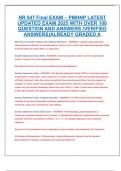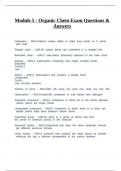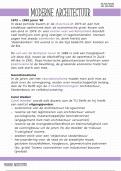NR 547 Final EXAM – PMHNP LATEST
UPDATED EXAM 2025 WITH OVER 100
QUESTION AND ANSWERS (VERIFIED
ANSWERS)ALREADY GRADED A
When do you consider Unipolar versus Bipolar depression - ANSWER>>Unipolar major depression
(major depressive disorder) is characterized by a history of one or more major depressive episodes (table
3) and no history of mania (table 1) or hypomania
Geriatric Depression Scale (GDS) - ANSWER>>Scoring Instructions. Score 1 point for each bolded
answer. A score of 5 or more suggests depression.
Self-reporting tool that may be used to diagnose and treat depression
Geriatric Depression Scale - ANSWER>>The Geriatric Depression Scale (GDS) is a self-report measure
of depression in older adults. Users respond in a "Yes/No" format. The GDS was originally developed as
a 30-item instrument. Since this version proved both time-consuming and difficult for some patients to
complete, a 15-item version was developed. The shortened form (GDS-S) is comprised of 15 items
chosen from the Geriatric Depression Scale-Long Form (GDS-L). These 15 items were chosen because
of their high correlation with depressive symptoms in previous validation studies
Geriatric Depression Scale: Targeted Population - ANSWER>>he GDS may be used with healthy,
medically ill and mild to moderately cognitively impaired older adults. It has been extensively used in
community, acute care, and long-term care settings.
Geriatric Depression Scale (GDS): Score - ANSWER>>Pharmacologic, psychotherapeutic, or
combination treatment indicated of the 15 items, 10 indicated the presence of depression when answered
positively, while the rest (question numbers 1, 5, 7, 11, 13) indicated depression when answered
negatively.
Scores of 0-4 are considered normal, depending on age, education, and complaints; (No Treatment)
5-8 indicate mild depression; (Pharmacologic or psychotherapeutic treatment may be indicated
Base treatment on duration of symptoms and functional impairment
,9-11 indicate moderate depression; (Pharmacologic, psychotherapeutic, or combination treatment
indicated)
12-15 indicate severe depression.(Pharmacologic, psychotherapeutic, or combination treatment indicated
Geriatric Depression Scale (GDS): Indication for Intervention - ANSWER>>The presence of depression
warrants prompt intervention and treatment. The GDS may be used to monitor depression over time in all
clinical settings.
Any positive score above 5 on the GDS Short Form should prompt an in-depth psychological assessment
and evaluation for suicidality.
Patient Health Questionnaire [PHQ-9] - ANSWER>>A brief 9-item self-report questionnaire used as a
screening tool to assess severity of depression; widely used by health care providers, in validity is well
established, particularly for identifying severe depression.
The Beck Depression Inventory (BDI) - ANSWER>>Widely used to screen for depression and to measure
behavioral manifestations and severity of depression.
The BDI can be used for ages 13 to 80. The inventory contains 21 self-report items which individuals
complete using multiple choice response formats.
The BDI takes approximately 10 minutes to complete. Validity and reliability of the BDI has been tested
across populations, worldwide.
Center for Epidemiologic Studies Depression Scale (CES-D) - ANSWER>>Designed for use in the
general population and is now used as a screener for depression in primary care settings.
It includes 20 self-report items, scored on a 4-point scale, which measure major dimensions of depression
experienced in the past week.
The CES-D can be used for children as young as 6 and through older adulthood. It has been tested
across gender and cultural populations and maintains consistent validity and reliability. The scale takes
about 20 minutes to administer, including scoring.
, EQ-5D - ANSWER>>The EQ-5D is a standardized, non-disease specific instrument for describing and
evaluating health-related quality of life. The instrument measures quality of life in five dimensions:
mobility, self-care, usual activities, pain/discomfort and anxiety/depression.
Hamilton Depression Rating Scale (HAM-D) - ANSWER>>
Mood Disorders: Depression - ANSWER>>Sadness, lethargy, inactivity and feelings of helplessness and
hopelessness
Genetic link
Behavioral changes: slower motor reactions
Cognitive changes: cognitive distortions
Physical changes: alters immune functioning
PQ9 Scores - ANSWER>>Depression Severity
5 - 9Mild
10 - 14Moderate
15 - 19Moderately Severe
20 - 27Severe
scores current depression severity and to follow up treatment response.
Depression: Anxious distress Modifier - ANSWER>>Depression with unusual restlessness or worry about
possible events or loss of control
Depression: Mixed features - ANSWER>>Simultaneous depression and mania, which includes elevated
self-esteem, talking too much and increased energy
Depression: Melancholic features - ANSWER>>Severe depression with lack of response to something
that used to bring pleasure and associated with early morning awakening, worsened mood in the
morning, major changes in appetite, and feelings of guilt, agitation or sluggishness
Depression: Atypical features - ANSWER>>Depression that includes the ability to temporarily be cheered
by happy events, increased appetite, excessive need for sleep, sensitivity to rejection, and a heavy
feeling in the arms or legs
Depression: Psychotic Features - ANSWER>>Depression accompanied by delusions or hallucinations,
which may involve personal inadequacy or other negative themes






